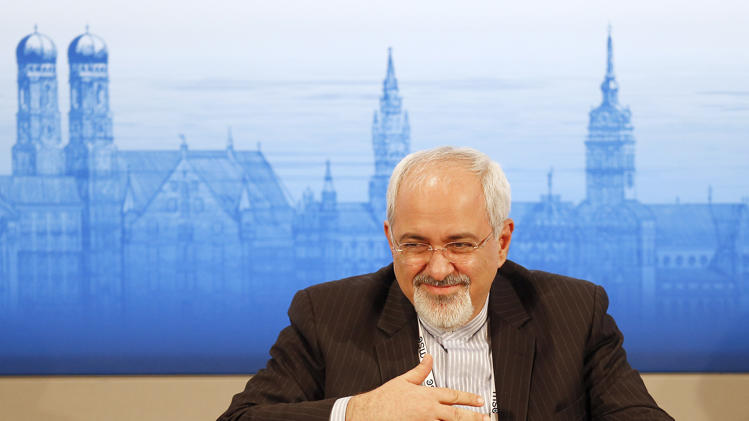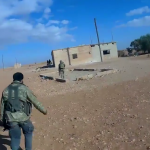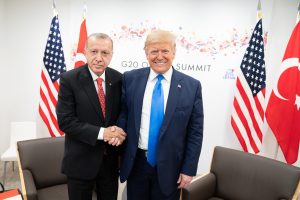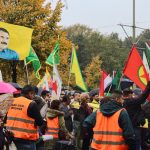by Farideh Farhi
The meeting between Javad Zarif and John Kerry on the sidelines of the Munich Security Conference on Feb. 2 was reportedly mostly focused on nuclear negotiations. But this didn’t prevent a “senior US official” from telling reporters that Kerry also tried to bring in Syria.
According to this anonymous official, “Secretary Kerry raised his concerns about the delay in moving chemical weapons to the port in Latakia, and the humanitarian situation on the ground specifically in the besieged areas.” Iran was also urged “to show a willingness to play a constructive role in bringing an end to the conflict.”
Alas, again according to the US official, when Kerry raised the issue, Zarif indicated that he was not authorized to discuss Syria.
This is an interesting plant devoid of any context for the reader regarding why Zarif might not want to talk about Syria with Kerry. To be sure, Steven Erlanger of the New York Times did offer one line of context: Zarif apparently declined to participate in this conversation because “Iran’s policy on Syria is not controlled by the Foreign Ministry.”
Conveniently forgotten is Kerry’s condescension on Jan. 6 that Iran could “contribute from the sidelines… to help the process.” The spectacle of Iran’s invitation and then dis-invitation by Ban Ki-moon to Geneva II under pressure from the same Secretary of State is not mentioned either.
Even those who may be unfamiliar with Iranian politics will be able to discern that Zarif’s refusal had less to do with his lack of authorization to talk Syria policy and more with the decision of the political leadership in Iran, which now includes Zarif, to tell Kerry that he cannot have his cake and eat it too.
Ultimately, this event is telling commentary about the US leadership’s presumption that it can easily engage in public denigration of Iran and then have a closed-door conversation regarding the input Iran can — and should — have in a process that it was barred from participating in publicly.
Let’s be clear, the issue was not Zarif’s lack of authorization per se. The point was that if Iran is called upon to show a “willingness to play a constructive role,” then it should be treated like a stakeholder in the process. Kerry’s predicament was likely caused by a full-blown Saudi freak-out over Iran’s participation. But given the circumstances, there is really no reason for Iran to show understanding of Kerry’s predicament even behind closed doors.
Zarif has as much input in Iran’s Syria policy these days as Kerry does in the US’ Syria policy. The highly fluid dynamics on the ground limits them both; so does input by other institutions, including the military and security establishments, and domestic political actors. The difference lies in the current reality that the US’ Syria policy is confused, conflicted and under pressure while Iran’s is not.
Iran’s support for the Assad regime is odious and yet its long-standing warnings that the attempt to remove Bashar al-Assad will open the path for sectarian extremism and a deepening of the conflict — irrespective of whether the Assad regime or even the Iranian regime have fed extremism and the conflict — have proven correct. Tehran faces little pressure or conflict at home regarding its role in Syria and can rely on Moscow to make sure that Assad does not fall. Lest we forget: it was Russia that prevented UN Security Council resolutions against Assad’s regime. And despite all sorts of reports regarding Iranian arms shipments, technical and intelligence assistance, and even personnel support, Russia remains Assad’s much more consistent and robust arms supplier and supporter.
This is why Zarif reacted to Iran’s dis-invitation to Geneva II with a shrug. An invitation would have been nice and an official acknowledgment of Iran’s role as a key player in the region. It would have also made Iran a stakeholder in the resolution of the Syrian conflict through an internationally guided process. A behind-closed-doors conversation regarding what Iran can do to help, on the other hand, offers nothing.
Meanwhile back in the USA, if this report is correct, even Kerry has lost faith in his administration’s approach to the crisis in Syria. Laments are plenty: Assad is failing to uphold his promises on chemical weapons; Russia is not helpful and continues to supply arms (there is tellingly no reference to Iranian arms and support here); and Geneva II is not working. In the hawkish Senator Lindsey Graham’s rendition, Kerry “openly talked about supporting arming the rebels. He openly talked about forming a coalition against al Qaeda because it’s a direct threat.”
Graham is likely placing his wishes on Kerry’s tongue. Nevertheless, he stands at one pole pressuring an administration that is well aware of another pressure pole consisting of a general public that wants nothing to do with another mission creep in the Middle East. If the political process doesn’t go anywhere, pressures to do something else are bound to increase.
But as far as the US-Iran dynamic regarding Syria is concerned, the basic issue persists. If Iran is influential in sustaining the Assad regime, then turning it into a stakeholder in the political process makes eminent sense — but not behind closed doors or on a seat in the back of the room.






James, I haven’t been keeping up with the latest negotiations between Israel and Palestinians. I’d like to see the original UN boundaries for Israel be the final one but this time, the UN must support Israel’s right to exist and do whatever is necessary to protect her boundaries. For those Palestinians forced off their property, they should be allowed to return to Israel or be compensated for their properties.
A lot of Israel’s bad behavior comes from having some of their citizens having survived the Holocaust and being afraid that other countries will try to push them around. The Holocaust isn’t an excuse but it does explain their behavior somewhat.
Iran being a state sponsor of terrorism has armed Israel’s neighbors to attack it. I have absolutely no respect for the Iranian or Syria governments. Neither country can be trusted at all! I’d imagine that many of their citizens are as unhappy with their governments as I am.
@Patricia – – I agree the Green Line (1949 armistice) should be the border of Palestine, perhaps with a few tweaks here and there.
Israel in fact wants to keep half or more of the remnant of Palestine east of the Green Line.
James,
I empathize with the Jews/Israelis because after the Holocaust, of course they wanted a country to be able to retreat to if they were facing persecution in other countries. The UN and Britain set Israel up by not hammering out an agreement back in 1947! The UN is a disgrace. The US funds most of it and it is pretty much a do nothing organization! It’s the UN responsibility to get a settlement fair to both groups: Israelis and Palestinians and send in UN troops to enforce it.
“… The General Assembly voted, 33-13, in favor of partition, with 10 members, including Britain, abstaining. The six Arab nations in the General Assembly staged a walkout in protest. The New York Times reported: “The walkout of the Arab delegates was taken as a clear indication that the Palestinian Arabs would have nothing to do with the Assembly’s decision. The British have emphasized repeatedly that British troops could not be used to impose a settlement not acceptable to both Jews and Arabs, and the partition plan does not provide outside military force to keep order. Instead, it provides for the establishment of armed militia by the two nascent states to keep internal order.” …”
Source: http://learning.blogs.nytimes.com/2011/11/29/nov-29-1947-united-nations-partitions-palestine-allowing-for-creation-of-israel/?_php=true&_type=blogs&_r=0
vs
http://en.wikipedia.org/wiki/1949_Armistice_Agreements
Patricia, it’s very hard to substantiate what goes on in Syria, as well as who’s doing what, from both side. As for starving and bombing the citizens, it’s a two way street in that regard. As for Israel having intel or believes Iran is obtaining Nuclear weapons, didn’t they sucker the U.S. into invading Iraq, and how has that turned out? You mention no fly zones in Syria, but the history of said “no fly zones” ( look what happened to Iraq during the 90’s up to when the U.S. invaded), also look @ Libya and how that has turned out. Buying into the myths and lies, doesn’t produce peace. Oh, another thing, Saudi Arabia, funding the jihadists in Syria with weapons, do you find that O.K.? Don’t misunderstand what I’m saying here, but you seem to be one who drinks the koolaid.
Patricia, you empathize with the Israelis, wanting a homeland. Stealing the land from the Palestinians as well as the atrocities committed right up to the present time, is any thing but “good neighbor policy”. The problem stems from the Zionist leadership being warmongers and now with that oil and gas off the coast, they want to control that too, not share with the Palestinians. Power corrupts, no matter who, as well as greed too. One only has to look at the Financial debacle that has been foisted upon most everyone by Wall street and the Banks, to understand what I’m saying.